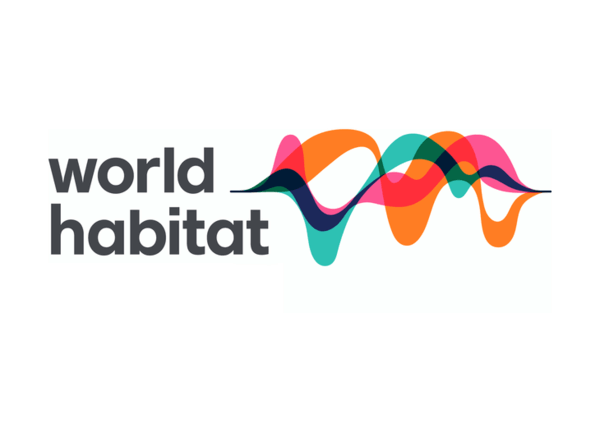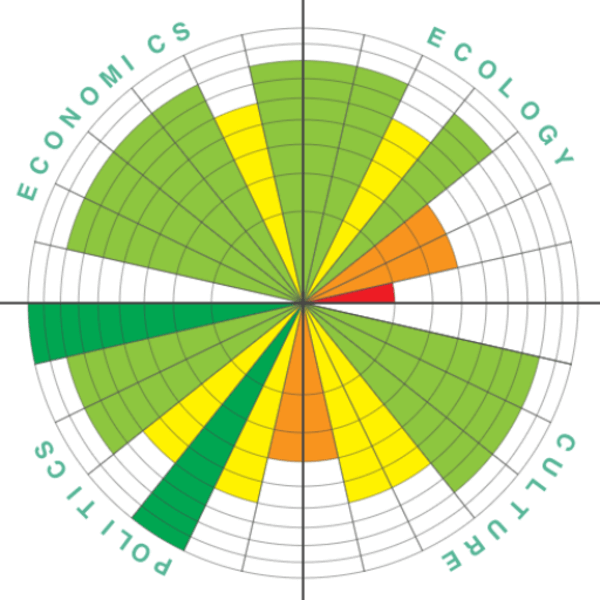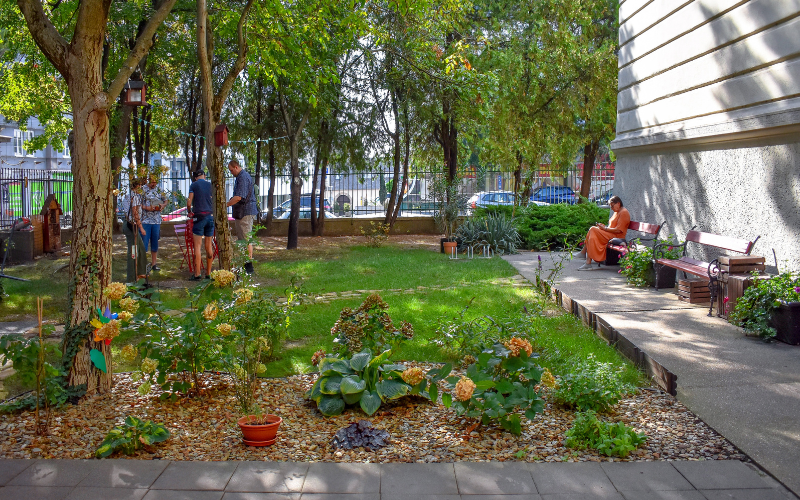 Crossroads garden - © STOPA Slovensko
Crossroads garden - © STOPA Slovensko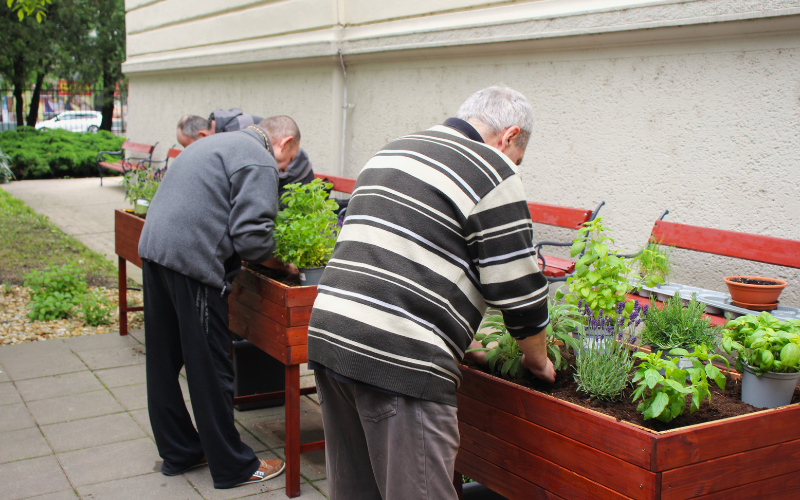 People using the garden - © STOPA Slovensko
People using the garden - © STOPA Slovensko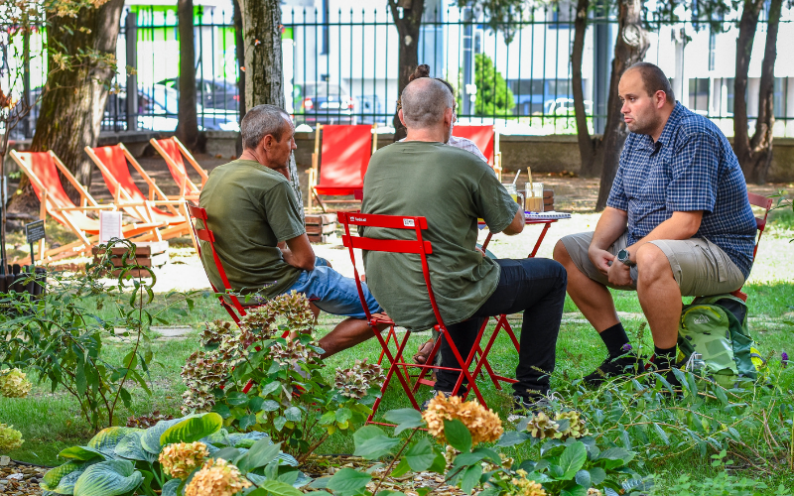 Clients - © STOPA Slovensko
Clients - © STOPA Slovensko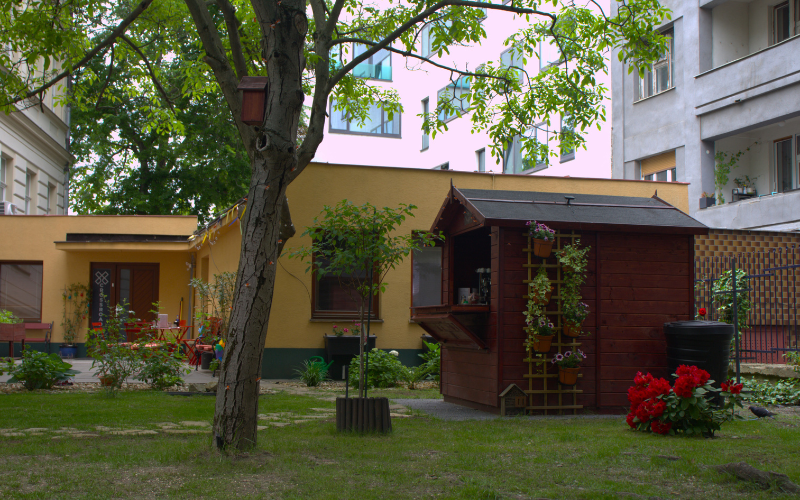 Garden and building - © STOPA Slovensko
Garden and building - © STOPA Slovensko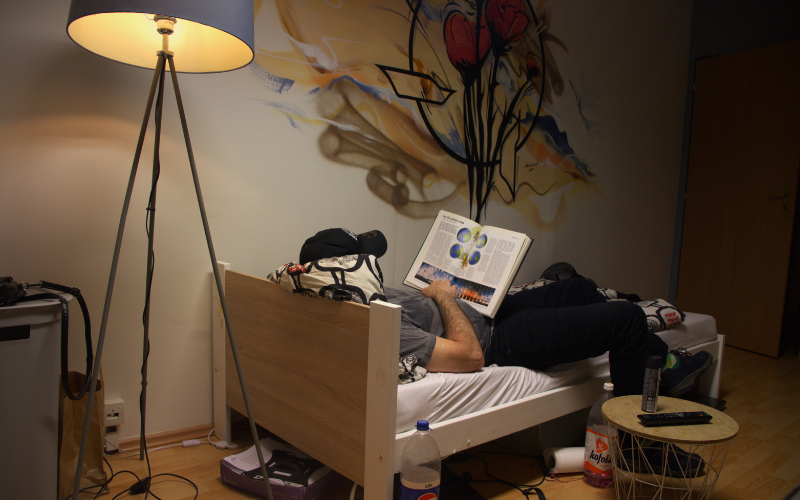 Person reading - © STOPA Slovensko
Person reading - © STOPA Slovensko
City
Bratislava
Main actors
Private Sector, NGO / Philanthropy, Community / Citizen Group, Research Institutes / Universities
Project area
Whole City/Administrative Region
Duration
Ongoing since 2016
STOPA is a pioneering organisation tackling homelessness in Slovakia, a country with scarce affordable housing and negative public perceptions of those forced to sleep on the streets. Founded in 2015, STOPA is committed to preventing long-term homelessness through housing-led approaches which provide stable homes, early intervention and comprehensive support services.
By learning from international best practices and involving clients in decision-making, STOPA has created a unique and effective model. The Solidarity Cafe, a community hub, gives people the opportunity to work and challenges stereotypes about homelessness. Beyond housing, STOPA offers mental health support, occupational therapy, and environmental initiatives.
The organisation has supported nearly 1,000 individuals and played a vital role in assisting Ukrainian refugees and also during the refugee crisis for people fleeing Syria.
Full project summary originally published by World Habitat Awards.
World Habitat Awards
This project was awarded the 'World Habitat Awards' in 2025 in the following category: Siliver Prize.
STOPA Slovensko is a non-governmental organisation working on homelessness prevention and social inclusion and is the only organisation in Slovakia working on housing-led solutions. Formed in 2016, its work focuses on street outreach, housing provision and helping people living on the streets to learn new skills. Their work is supported by OZ PRIMA, delivering substance misuse and alcohol support to people across Bratislava.
It is a member of World Habitat’s European End Street Homelessness Campaign.
STOPA adapts well to changes in the surrounding social and political environment, helping those at risk during the COVID pandemic (2020) and refugees from Ukraine (2021) and Syria (2023). Following the Russian invasion of Ukraine, STOPA provided refugees with humanitarian supplies and quickly established temporary shelters, hotel accommodation and welcome centres with childcare support. It set up housing programmes within communities for refugees to access safe and secure housing in host homes. It provided emergency support for refugees to connect with relatives access social services and psychological support. Now, it is helping refugees with longer-term integration, primarily housing. It also reconnects people with family abroad and fills the gaps left by national governments supporting Ukrainian nationals that are unable to return home.
Objectives
STOPA considers its work fundamental to providing safe and secure housing to the most marginalised. It aims to:
a. Prevent long term homelessness by intervening early
b. Deliver inclusive services that are specialised towards groups lacking support
c. Increase housing availability for those currently or at risk of homelessness
d. Cultivate broader policy change and improve public perceptions of homelessness
The project aims to provide services to:
• People immediately at risk of death on the streets
• Those who have just lost their homes
• Short-term rough sleepers / those in short-term crisis
• People who have just left prison
STOPA’s first activities focussed on street outreach and social work support for people living on the streets. During the last eight years, the NGO has looked to develop new approaches and change attitudes towards homeless people, finding evidence-based solutions often developed in other countries but with greater government support and access to funding. However, through its innovation STOPA has found effective ways to adapt them to a more challenging environment, with limited funding. It now offers:
Streetwork: To address the lack of reliable data on the individuals experiencing homelessness, STOPA maps and assesses the scale of homelessness in Bratislava and then takes action. It targets early intervention to prevent long-term homelessness and has created a network to identify short-term homeless people and then signpost them to facilities that can support them. Its interventions take many forms, ranging from crisis intervention for those at immediate risk of death to longer-term interventions focused on motivating people to go to STOPA’s ‘integration centre.’
Integration centre: This is a specialised facility focused on both prevention and reintegrating people experiencing homelessness. It provides legal support, financial advice, employment assistance, housing support, communication support with authorities, and familial support, among other services. It also offers work therapy to help people develop skills through paid work, including urban gardening.
Specialised counselling: Tackling issues resulting from a person’s experience with homelessness, including trauma, fears, communication, conflicts and cognitive behavioural issues, to support independent living.
Solidarity café: This non-profit garden cafe opened in August 2023. It runs an urban gardening project and provides barista training, as well as training in communication and language skills. It helps participants prepare for future employment with a paid salary and job experience. It also challenges stereotypes around homelessness, highlighting that many homeless individuals are actively working to improve their situation.
STOPA delivers three main housing services:
Crossroad: STOPA has renovated four apartments to provide permanent housing. The resident receives social support services and professional counselling to help build an independent life, and is not under any time limit to leave. There are five people currently living in these apartments (two people requested to share). The first two months are rent-free while STOPA helps individuals find a job and to get certain support (occupational therapy, pension schemes in-place. After those two months, apartment residents will co-pay €100 Euro (£85 GBP) per month. The co-payment amount can never exceed two-thirds of the residents’ income. There is also a crisis bed provided for free for quick interventions.
Housing First: STOPA currently houses nine clients4 in its Housing First project that uses several municipal dwellings. It also offers significant psychological and mental health support. The flats are bought by a bank and rented to STOPA at non-market price on one-year leases.
Housing Benefits: This is the preventative, co-financed model of support for short-term rough sleepers or those in crisis. STOPA supports individuals with housing, financial and employment support and other services to help them regain control of their life. Housing benefit support is limited to three months. STOPA supports about five people, families or couples each year. These housing services are offered and adapted to the client depending on their preference and need.
Multi-faceted and Tailored Support.
Clients can access holistic co-financed support that helps them with housing as well as social, psychological and economic support services. The project understands that different people need different types of support at different stages of homelessness, based on their preferences and background so it aims to meet those diverse needs. It provides crisis interventions and services to people immediately at risk of death on the streets. It targets those who have just lost their homes, are short-term rough sleepers or have just left prison with the housing benefit scheme to prevent longer-term homelessness. The Crossroad project supports both; it houses those who have a long history of homelessness, but also offers “trampoline beds” for those in a short-term crisis. A significant number of STOPA’s clients are elderly and have experienced homelessness for long periods.
Direct Involvement.
Clients and residents are consulted regularly on the services offered, as well as smaller day-to-day work and living questions. Clients working in the cafe gradually take over its management, while others make lifestyle requests that are accommodated as best as possible. For example, when a situation of concealed drinking arose, STOPA closely consulted with clients about introducing a controlled drinking scheme but decided not to after two clients were concerned of risks to their sobriety given their history of severe addiction.
Civil Society Partnerships.
STOPA works with partners on the local to international level, to provide housing support services. It works directly with NGOs to help people access specialist services. For example, NGO Prima provides support that helps with addiction and risk reduction. STOPA also works with Bratislava Volunteer Centre and is a practice site for social work and psychology students.
Evidence-based Adaptation
Through the European End Street Homelessness Cities (EESHC) alliance, STOPA adapted its model from crisis response to wider homelessness prevention and housing led services. STOPA adapted the ‘Vulnerability Index – Service Prioritisation Decision Assistance Tool’ for its pilot street survey during the EESHC Connections Campaign. The survey was used to connect and understand the needs of those experiencing homelessness and also to counter the state-led narrative at the time that homeless people ‘do not exist.’ STOPA launched its ‘No-one is Invisible’ campaign, advocating for government recognition of homelessness and highlighting the gaps in support services. Other services including the Solidarity Cafe and Housing First model have been inspired by EESHC partners and adapted to Slovakia’s context.
Crisis Response.
STOPA mobilises it services very quickly to respond to crisis situations, including in response to Syrian and Ukrainian refugees. It also has ‘trampoline’ beds for individuals in short-term crisis helping those at immediate risk, before providing them with more support as needed.
Non-segregation.
is key to STOPA's wider advocacy role. This was enacted by the ‘No-one is invisible’ campaign where white masks symbolised being ‘lost’ and shirts with ‘outsiders’ were worn to challenge the legal invisibility of those who experience homeless. The Solidarity Cafe also invites the public to learn more about solutions to homelessness and interact with those experiencing homelessness, which counters harmful stereotypes and bridges understanding. This is seen as crucial to bringing the public together and strengthening voices calling for decent social services and support services. Finally, STOPA’s housing stock is in the center of the city to prevent the removal of those experiencing homelessness to shelters in the city outskirts where they are out of sight.
The project is currently stable with plans to expand housing capacity with two more apartments targeted at senior women with a history of street homelessness.
STOPA would also like to increase its psychological support services for those experiencing homelessness.
STOPA plans to complete a large-capacity stormwater catch basin to be stored underground and used to service the Crossroads project. It also plans to build raised garden beds for useful crops that can be used by those experiencing homelessness. It will also install beehives, green roofing and solar panels.
STOPA’s funding is sourced from multiple areas. Registered services are financed by the city, city districts and the Bratislava Region according to the law on registered social services (Ministry of Labour, Capital City Council, Bratislava Self-Governing Region). STOPA also receives several grants from various companies, regular donors, and corporate partnerships. The annual budget is €195 052 Euro ($211,226 USD). The expected budget for 2024 is the same.
Within that budget, Crossroads costs €180,000 Euro ($194,929.20 USD) and is pre-paid for 10 years. STOPA does not own the flats, but they are under its management for those 10 years with the option to extend. The funding source is quite unique for Central and Eastern Europe as it comes from various grants, donations and private donors including Odyssey 44 Foundation, SLSP Foundation and CAP Foundation.
Funding is secured for the Crossroads until 2031 while other services (Housing First apartments, Housing Benefits) are funded through city and regional funding. The Housing First flats are rented out to STOPA on one-year leases at around half the market price €350 Euro – €450 Euro ($380 USD - $488 USD).
World Habitat is funding STOPA with an innovation grant of €4,999 Euro ($5,413 USD) this year.
Evaluation
The project is measured according to the following indicators:
Direct (individual):
a) A person who needs support through the integration sector
b) Access to safe, permanent housing
c) Shifts in self-perception
d) Employment status
e) People receiving mental health support/treatment for their severe addictions.
Indirect (community/society)
a) Number of cafe and garden visitors
b) Shifted perceptions around homeless people
Financial Impact
• In eight years, STOPA has found safe and secure housing for 75 individuals.
• STOPA has renovated four apartments to provide accessible, safe housing to those experiencing homelessness. In its first year it focused on housing people in crisis – 18 people over that period. 15 of these 18 transitioned to stable housing situations.
• The four apartments are now set up to provide both crisis support – trampoline beds for individuals in crisis - and permanent housing. Five residents are currently in permanent housing. Two of the rooms are shared, at the request of the residents themselves as they knew each other previously while the third room is single occupancy.
• The focus on work therapy and skills training encourages the economic integration of clients to help them earn their own incomes long-term. In the Crossroads housing project, five people have found permanent work.
• The Solidarity Cafe has enabled clients to develop business and service skills, as well as integrating with the wider community. 15 people a day visit the Café.
• 350 people – those experiencing homelessness and people at risk of losing their housing – have received social, economic and housing support from the integration centre.
• People are not only physically healthier but receive psychological support to process trauma and the mental impact of experiencing homelessness, improving their wellbeing and mitigating the risk of recurring homelessness.
Social Impact
• Those experiencing homelessness have a stronger sense of ownership, particularly through their involvement in the Solidarity Cafe’s Garden.
• Occupational therapy through urban gardening and green space activities, focused on planting and transforming public spaces that have outlived their purposes. Clients plant and carry out renovations in senior citizens’ homes, schools and kindergartens.
- This creates greater cohesion between seniors and children working with those experiencing homelessness.
- Occupational therapy has been effective with Ukrainian refugees through planting, making bird houses and other environmental activities.
- Clients remove illegal tipping in urban forests and they have begun to recycle and remove waste from the forests improving conditions for those living in makeshift shelters in the area.
• STOPA’s social, homelessness and housing support services were used to provide support to 395 Ukranian refugees, including 113 mothers and 195 children. It rapidly set up childcare services, temporary shelters and welcome centres before transitioning them to longer-term integration support when needed.
Environmental Impact
• With environmental stability can also come social stability. Therefore, environmental initiatives are directly tied to psychological and mental wellbeing work; STOPA also has an in-house environmental ecologist that integrates environmental considerations into homelessness support services.
• The Solidarity Cafe includes a garden where clients can plant various trees and shrubs. STOPA aims to contribute to reducing the so-called heat island of Bratislava and increase green spaces that have a cooling effect.
• In the garden, STOPA encourages biodiversity of species while the garden is irrigated with collected rainwater. It uses natural fertilizers and no industrial pesticides, while attracting different insects through insect hotels.
• The herbs grown in the garden are used in the Solidarity Cafe’s menu and the cafe itself recycles all materials. The dishware and accessories are all second-hand and the takeaway cups are compostable.
Slovakia’s significant levels of homelessness are mostly addressed on an emergency and temporary basis by shelters kept out of sight from the general public. Homelessness services are under-resourced and under-funded, leaving many without support and living on the streets. The availability of affordable, decent and safe housing is limited and there is no tradition of social housing. The social rented sector is minimal at 2%, and the private rental sector runs partly as a grey market.
There is no legal definition of homelessness and no reliable national data. The last country-level data from 2011 reported over 23,000 people in longterm transitional shelters, excluding rough sleepers and those in emergency accommodation. Recent counts in Bratislava showed around 2,000 homeless individuals, with 30% being rough sleepers and nearly a third in homeless accommodation services. Lone middle-aged men make up a big percentage of rough sleepers, with 50% having long-term health issues and 40% being homeless for over ten years2 . Since the early 2010s nearly 10,000 individuals accessed homelessness services across Slovakia, with significant increases in night shelter and hostel use.
STOPA plans to continue promoting Housing First and housing-led solutions to relevant decisionmakers in Bratislava. However, this project purposely does not hinge on government support, ensuring it can grow in a challenging environment. It plans to influence nongovernmental organisations nationally and regionally, encouraging them to create similar projects and it strongly believes in open-source knowledge exchange.
External links / documents
On Map
The Map will be displayed after accepting cookie policy
